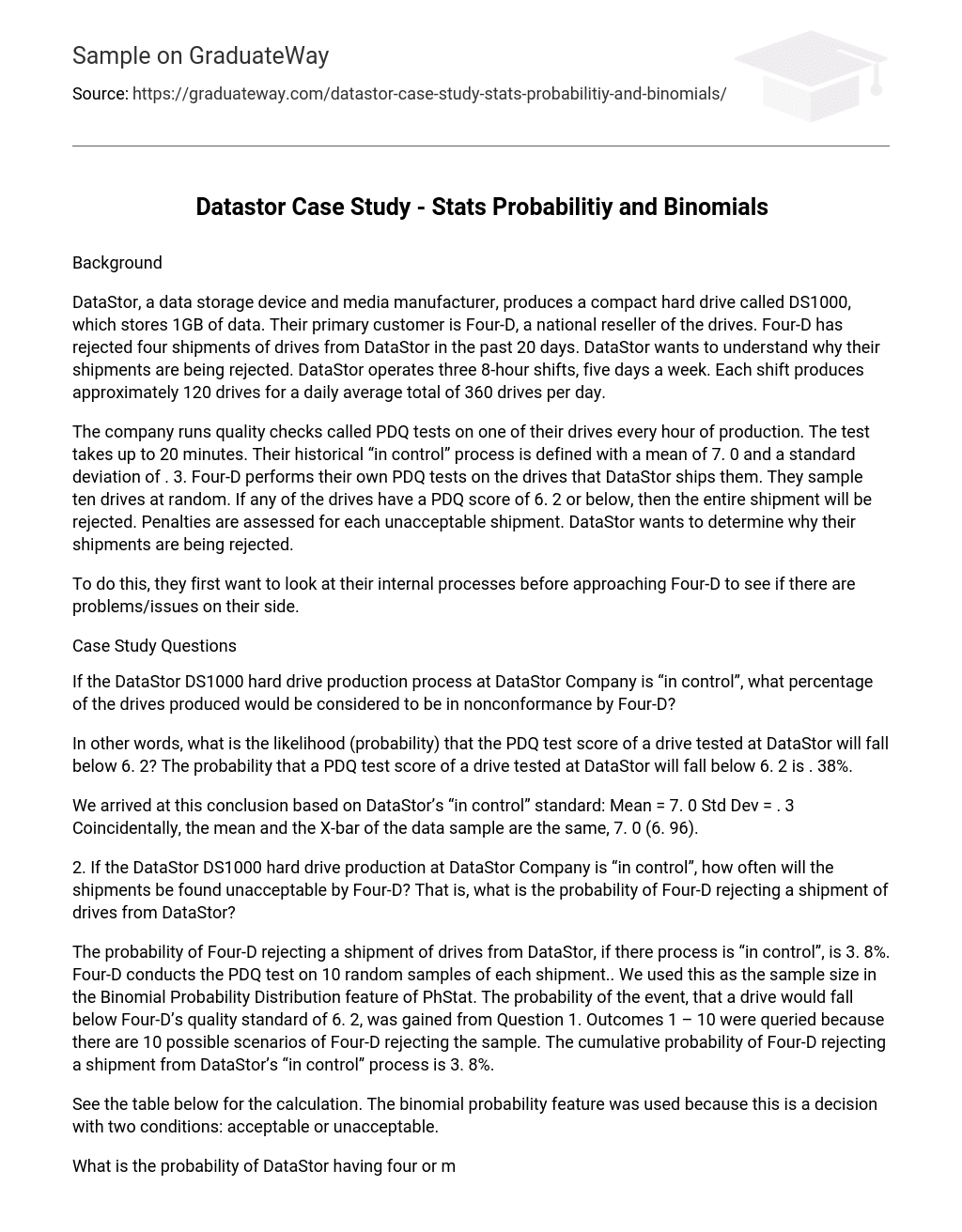Background
DataStor, a data storage device and media manufacturer, produces a compact hard drive called DS1000, which has a capacity to store 1GB of data. Their main customer, Four-D, is a national reseller of the drives. Four-D has declined four shipments of the DS1000 hard drives from DataStor within the last 20 days. DataStor aims to ascertain the reasons behind the rejection of their shipments. The company operates three shifts, each lasting 8 hours, and operates five days a week. On average, each shift produces approximately 120 drives, resulting in a daily total of 360 drives.
DataStor conducts PDQ tests on their drives every hour of production. These tests, which take up to 20 minutes, are quality checks that help ensure the drives meet the company’s standards. The historical process for evaluating these tests is based on a mean of 7.0 and a standard deviation of 0.3, which defines whether the process is “in control.” When DataStor ships drives to Four-D, Four-D also conducts their own PDQ tests on a random sample of ten drives. If any of these drives have a PDQ score of 6.2 or lower, the entire shipment is rejected, leading to penalties for DataStor. Therefore, DataStor is eager to investigate the reasons behind the rejections of their shipments.
Before approaching Four-D, they want to examine their internal processes to determine if there are any problems or issues on their side.
Case Study Questions
If the DataStor DS1000 hard drive production process at DataStor Company is “in control”, what is the percentage of drives produced that Four-D would consider to be in nonconformance?
The PDQ test score probability of a drive tested at DataStor falling below 6.2 is 0.38%.
Based on DataStor’s “in control” standard, we have determined that the mean is 7.0 and the standard deviation is 0.3. Interestingly, the mean of the data sample is also 7.0 (6.96).
2. In the event that the production of DataStor DS1000 hard drives at DataStor Company is considered “in control”, what is the frequency at which Four-D will find the shipments unacceptable? In other words, what is the probability of Four-D rejecting a shipment of drives from DataStor?
The probability that Four-D will reject a shipment of drives from DataStor, assuming their process is “in control”, is 3.8%. Four-D performs the PDQ test on 10 random samples from each shipment. This sample size was used in the Binomial Probability Distribution feature of PhStat. The probability of a drive falling below Four-D’s quality standard of 6.2 was determined from Question 1. Outcomes 1-10 were examined because there are 10 possible scenarios in which Four-D rejects the sample. The cumulative probability of Four-D rejecting a shipment from DataStor’s “in control” process is also 3.8%.
Consult the table below for the calculation, as it involves two possibilities: acceptable or unacceptable. The binomial probability feature is utilized for this decision.
What is the likelihood that DataStor will have four or more shipments rejected by Four-D within a twenty-day period, considering that their production process is considered “in control”?
Using DataStor’s “in control” process, the probability of Four-D rejecting 4 or more shipments in twenty days is 0.6%. This probability was calculated using the PHStat Binomial Probability Distribution feature, which takes into account whether a shipment is accepted or rejected. The sample size for this calculation is based on a 20-day sample. In Question #2, we determined the event’s probability to be 0.3765 based on a sample size of 10.
Additionally, the cumulative probability of Four-D rejecting shipments from 4 to 20 is also 0.6%. We specifically chose to examine the probability of Four-D rejecting 4 or more shipments in a span of 20 days by selecting outcome parameters of 4 to 20 shipments.
In light of the analysis conducted in (1) – (3) mentioned above, what is your overall conclusion about the probability of DataStor experiencing a high rate of recent shipments being rejected by Four-D, assuming their manufacturing process is “in control”?
Based on the data we have seen in Questions 1-3, there is a 0.38% probability of finding a hard drive with a PDQ score less than 6.2. The probability of Four-D rejecting a shipment is 3.8%. The PDQ test sample data was provided for 3 shifts per day, for each of the 5 days of the week, for 10 weeks. We divided the data according to the shifts to determine whether the quality of work for a given shift could explain the rejection rate from Four-D. The table below is based on the PDQ sample data. Shifts 1 and 2 meet DataStor’s “in control” mean. Shift 3 does not meet DataStor’s “in control” mean of 7.0.
Shifts 1 and 2 are aligned with the sigma X-bar, based on the sample data of their respective groups. However, Shift 3 has a higher sample standard deviation compared to the sample sigma x-bar.
What is causing the problem at DataStor? Is it the increase in drive nonconformance, the higher quality requirements by Four-D Office Products, damage during shipment, or random variation? What evidence supports your conclusion?
There are several reasons for the problems at DataStor.
- The production of Shift 3 is not stable. The mean PDQ score is 6. 88 with a std deviation of 0. 155, this is higher than the sample std dev of the sample mean, which is 0. 106. Production for shifts 1 and 2 and within their target limits. Following graphs show that PDQ score in shift 3 falls below LCL
- Datastor recently began plotting average of 8 PDQ score collected over each shift instead of individual values. This could be the reason why Datastor not able to identify the problem with quality. e. g. Lowest PDQ score for a shift is 6. 49.
Due to this being the average of 8 PDQ scores, there is a chance that the PDQ score could be lower than 6.2. However, Datastor is unable to recognize it. The graphs below provide evidence for questions 4 and 5.





